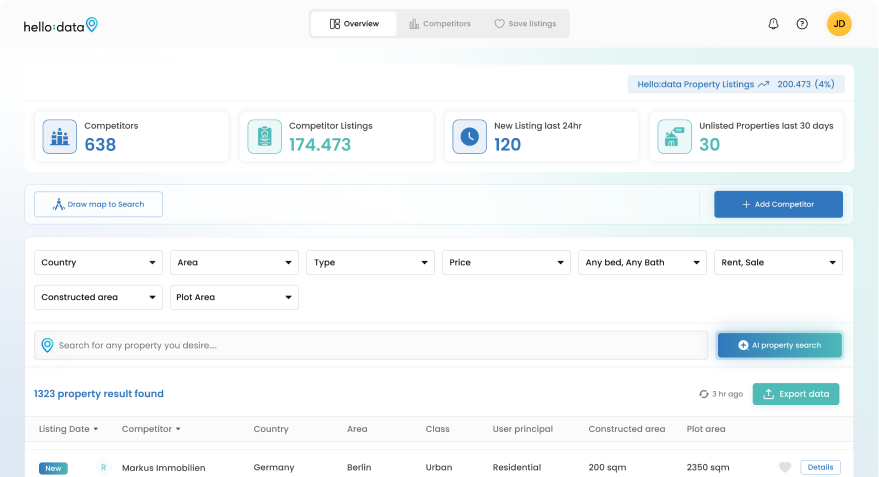Introduction
What is Rental Arbitrage in Real Estate?
Rental arbitrage is an innovative real estate investment strategy that allows individuals to lease properties and then rent them out on platforms like Airbnb or VRBO for a profit. This model capitalizes on the growing demand for short-term rentals, making it a significant player in today’s real estate market.
Importance in the Real Estate Market
- Accessibility: It provides an entry point for new investors with limited capital.
- Flexibility: Offers landlords an alternative to traditional long-term leases, enhancing property utilization.
How It Differs from Traditional Renting
- Lease Structure: In traditional renting, tenants sign long-term leases, while rental arbitrage involves short-term leases with the potential for higher cash flow.
- Revenue Potential: Rental arbitrage can generate greater income due to dynamic pricing and increased occupancy rates compared to static long-term rents.
Embracing rental arbitrage opens doors to lucrative opportunities in the evolving landscape of Proptech and Artificial Intelligence. It empowers individuals to transform their financial futures while adapting to modern housing demands.
Moreover, understanding concepts such as Opportunity Zones can further enhance investment strategies by providing significant tax incentives. Additionally, utilizing a Comparative Market Analysis can help determine property values more accurately, ultimately leading to better investment decisions.
The integration of AI technology into real estate is also noteworthy. From automated pricing to seamless tenant matching, AI-driven solutions are setting new industry standards as highlighted in the article about Hello:Here vs. YieldStar, LRO, and AIRM. Furthermore, understanding the difference between Black Box AI and Explainable AI (XAI) models is crucial in this rapidly evolving world of Artificial Intelligence, as discussed in the article about Black Box vs. Explainable AI. Lastly, employing techniques such as Sentiment Analysis can provide valuable insights into market trends by analyzing various sources such as social media and news articles.
Understanding Rental Arbitrage
Rental arbitrage is a dynamic business model that leverages the potential of short-term rentals while minimizing upfront investment risks. Here’s how it works:
1. Business Model
In rental arbitrage, investors lease properties from landlords with the intention to sublet them on platforms like Airbnb and VRBO. This arrangement allows for generating income by charging higher nightly rates than the monthly rent.
2. Comparison with Traditional Long-Term Rentals
Traditional long-term rentals typically involve fixed leases, providing stability but limited flexibility for income growth. In contrast, rental arbitrage offers:
- Higher earning potential
- Flexibility in pricing strategies based on demand
- Opportunity to cater to a diverse range of guests
For instance, while exploring options like Airbnb Plus, one can see how such platforms provide unique advantages over traditional rentals.
3. Role of Platforms
Platforms such as Airbnb and VRBO have revolutionized the short-term rental landscape. They empower individuals to easily list their properties and reach a global audience. These platforms also offer essential tools for managing bookings, guest communication, and property listings, making it easier for rental arbitrage operators to thrive.
As we delve deeper into this model, it’s crucial to understand certain metrics like breakeven occupancy which represents the minimum occupancy level required for a property to cover its operating expenses and debt service without incurring losses.
Engaging in this model not only opens doors to innovative income streams but also transforms how we perceive renting in the modern real estate market. The integration of technology, especially through platforms that utilize AI, is changing rental listings in unprecedented ways. Furthermore, understanding the economic base of a region can significantly influence real estate investment decisions.
The Business Model of Rental Arbitrage
Understanding the rental arbitrage model is key for anyone looking to tap into this lucrative investment strategy. This model allows individuals to lease a property long-term and then rent it out as a short-term vacation rental.
How It Works
- Lease Agreement: Enter into a lease with the property owner.
- Furnishing and Marketing: Furnish the space, then list it on platforms like Airbnb or VRBO.
- Income Generation: Earn income from guests, ideally exceeding monthly lease payments.
Financial Benefits
The potential for passive income is significant. Key benefits include:
- Higher Rental Rates: Short-term rentals typically command higher rates than traditional leases.
- Multiple Income Streams: Opportunities to add services such as cleaning or guided tours enhance earnings.
Legal Aspects
Navigating legal considerations is essential:
- Short-Term Rental Laws: Each locality has different regulations that can impact your operations. Understanding these laws protects your investment and ensures compliance.
- Tenant Rights & Landlord Obligations: Familiarity with local tenant rights helps maintain a positive relationship with your landlord while safeguarding your interests.
This model fosters an innovative approach to real estate, merging leasing and hospitality for maximum returns. The integration of PropTech into this model could further streamline processes, making property management more efficient. Additionally, understanding trends in multifamily housing and the Build-To-Rent (BTR) concept could open up new avenues for investment and profit.
How to Start a Rental Arbitrage Business
Starting a rental arbitrage business involves careful planning and taking action. Here are the key steps to help you get started:
1. Research the Market
- Identify areas with high demand for short-term rentals.
- Analyze local rental prices and occupancy rates.
- Consider using market segmentation strategies to find potential opportunities more effectively.
2. Find Suitable Properties
- Look for properties that attract tourists or business travelers.
- Consider the location’s proximity to attractions, public transportation, and local amenities.
3. Establish Agreements with Landlords
- Approach landlords with a clear proposal explaining rental arbitrage.
- Discuss important terms such as lease length, rent amount, and permission for subletting.
- Make sure all agreements are documented in writing to protect both parties involved.
By understanding how to start rental arbitrage, you’ll be able to make better decisions. Building a good relationship with property owners is essential for long-term partnerships and higher profits. Focus on gaining their trust while showcasing the advantages of your rental model. With each step you take, you’ll get closer to building a successful rental arbitrage business that meets the changing needs of the real estate market.
Initial Costs and Requirements in Rental Arbitrage Business
Starting a rental arbitrage business requires a clear understanding of initial costs. Here’s a breakdown of what to expect:
1. Security Deposit
Typically, landlords require a security deposit equivalent to one or two months’ rent. This acts as a safeguard against potential damages or unpaid rent.
2. First Month’s Rent
Expect to pay the first month’s rent upfront. This is standard practice and ensures you have access to the property from day one.
3. Furnishing Expenses
Furnishing your property is crucial for attracting guests. Budget for:
- Furniture (beds, couches, tables)
- Kitchen essentials (utensils, cookware)
- Decorative items (artwork, plants)
Furnishing not only enhances appeal but also significantly impacts guest experience, influencing reviews and repeat bookings.
Understanding these costs is vital for effective budgeting. Ensure you’re prepared for initial investments while keeping an eye on future cash flow. A well-furnished property can lead to higher occupancy rates and increased income potential, making it a worthwhile expenditure.
Legal Considerations in Rental Arbitrage Business
Understanding the legal aspects of rental arbitrage business is crucial for success. Compliance with local regulations can significantly impact your operations and profitability. Here are key points to consider:
1. Local Regulations
Different cities and states impose varying laws on short-term rentals. Some may require permits, while others could restrict the number of rental days or completely ban short-term rentals. Researching these regulations before starting can save you from potential fines or shutdowns.
2. Tenant Rights
As a tenant operating a rental arbitrage business, it’s essential to know your rights. This includes understanding eviction processes, lease terms, and any obligations to the landlord. Open communication with your landlord about your intentions can prevent misunderstandings.
3. Landlord Obligations
Landlords also have responsibilities under local laws. They must ensure that properties meet safety standards and comply with housing codes. Familiarizing yourself with these obligations fosters a positive relationship and aligns expectations.
Navigating the legal landscape of rental arbitrage ensures you operate within the law while maximizing your investment opportunities. Understanding these key areas sets a solid foundation for your business’s growth and sustainability.
Pros and Cons of Rental Arbitrage Business
Understanding the rental arbitrage pros and cons is essential for anyone considering this innovative approach in real estate.
Advantages for Tenants
- Low Upfront Investment: Entering the rental market without a significant financial commitment makes rental arbitrage appealing. Tenants can lease properties and sublet them on platforms like Airbnb without needing to purchase real estate.
- Potential Returns: With the right property in a desirable location, tenants can generate substantial income, especially during peak seasons. Utilizing AI property search technology can significantly enhance the chances of finding such lucrative properties.
Challenges Faced by Tenants
- Fluctuating Bookings: Income can vary significantly based on occupancy rates. Dependence on short-term rentals can lead to financial instability if demand decreases.
- Property Upkeep Responsibilities: Tenants must maintain the property in excellent condition. Regular cleaning, repairs, and guest management add to their workload.
Risks for Landlords
- Increased Wear and Tear: Frequent guests can lead to more wear and tear on the property. This may result in higher maintenance costs and potential disputes with tenants.
- Legal Compliance Issues: Landlords face risks if their properties are used for short-term rentals without proper authorization or adherence to local regulations.
Navigating these factors is crucial for success in the rental arbitrage business. Understanding both sides enhances decision-making and long-term planning in this dynamic field.
In this context, leveraging tools such as a multifamily rent survey can provide valuable insights into rental rates, aiding both tenants and landlords in making informed decisions. Furthermore, the artificial intelligence revolution in real estate is transforming every aspect of property management, from searching for rental units to managing them effectively using advanced SFR analytics tools.
Calculating Potential Profits from Rental Arbitrage Business
Calculating potential profits from rental arbitrage business involves a comprehensive analysis of various factors that directly impact earnings. Here are key methods to estimate profitability:
1. Revenue Projections
- Assess daily or weekly rental rates based on comparable properties in the area.
- Factor in occupancy rates, which can vary by season and location.
2. Expense Analysis
- Include fixed costs such as rent, utilities, and property management fees.
- Account for variable expenses like cleaning services, maintenance, and supplies.
Profit margins are influenced by multiple factors. Key considerations include:
1. Location
- High-demand areas typically yield higher rental rates and occupancy.
- Proximity to attractions, public transport, and amenities increases appeal. Understanding the Multiple Nuclei Model of Cities, which suggests urban areas develop around multiple centers or nuclei, can provide valuable insights into choosing profitable locations.
2. Market Demand
- Monitor local events and tourism trends that drive short-term rentals.
- Analyze competition within the market to identify pricing strategies.
By carefully evaluating these elements, you can create a detailed financial projection for your rental arbitrage venture. Understanding these dynamics empowers you to make informed decisions that enhance profitability in this evolving market.
Technology’s Role in Rental Arbitrage Business
Technological advancements have transformed the landscape of real estate investing. The integration of technology, particularly artificial intelligence (AI), has made it easier for rental arbitragers to manage properties and find lucrative opportunities.
The Impact of AI on Property Search
AI property search tools are changing the way we approach rental arbitrage. These technologies improve the efficiency of property searches, allowing investors to quickly identify listings with high potential. Applications like Hello Here exemplify this shift, offering features that streamline the entire process.
How Hello Here Revolutionizes Property Search For Rental Arbitragers
1. AI-Driven Matching
Hello Here employs advanced AI algorithms, such as Support Vector Machines, to match users with properties that meet their specific criteria. This personalized approach eliminates the frustration of sifting through irrelevant listings.
2. Comprehensive Listings
With access to over 82,000 properties in Mallorca alone, Hello Here surpasses traditional platforms like Zillow, which may only feature a fraction of these options. More listings equate to greater opportunities for rental arbitragers.
3. User-Friendly Interface
Designed with simplicity in mind, Hello Here’s app operates much like a dating app, making property matching intuitive and engaging. Users can easily navigate through potential rentals based on personal preferences.
Comparing Hello Here with Existing Platforms
While platforms like Zillow provide valuable data, they often fall short in targeted property searches. Key differences include:
- Volume of Listings: Hello Here aggregates data from various sources, providing a broader spectrum of available properties compared to competitors.
- Targeted Search Capabilities: The AI-driven nature of Hello Here allows for tailored results that reflect user preferences more accurately than general platforms.
Addressing Gaps in Targeted Property Searches
The gap in targeted property searches has long been a challenge for rental arbitragers. Traditional platforms struggle to deliver personalized results, leaving users overwhelmed by irrelevant options.
Hello Here addresses this issue by focusing on:
- Precision: AI algorithms analyze user input and past behaviors to refine search outcomes continuously.
- Real-Time Updates: The app ensures that users receive the latest listings as soon as they become available, facilitating timely decision-making.
In summary, technology is not just an accessory but a cornerstone of modern rental arbitrage. Embracing AI-driven real estate apps like Hello Here empowers investors by simplifying property management and enhancing profitability potential. With tools designed to meet the specific needs of rental arbitragers, such as understanding as stabilized value in real estate investments or utilizing geospatial analysis for better home sales strategies, the future looks bright for those willing to leverage technology in their real estate ventures.









